Why It Matters That The U.S. Talked With Venezuelan Coup Plotters
The fact that American officials talked with Venezuelans plotting a coup against the government of their country is a dangerous turn of events.
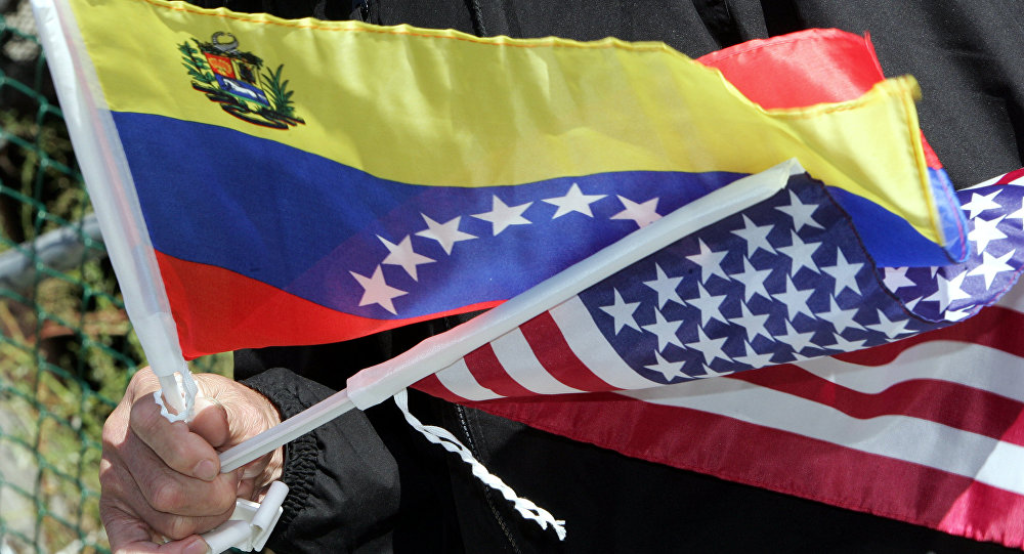
As Steven Taylor noted yesterday, it is being reported that American officials met with members of the Venezuelan military believed to be behind the recent efforts to overthrow the regime of Venezuelan President Nicolás Maduro including, apparently the drone attack that occurred at the beginning of August which eventually resulted in the arrest of two military officers alleged to be behind the attack. As it turns out, nothing ever came of those meetings and the United States has not provided any aid or assistance to either these officers or any of the participants in the past attempts to overthrow Maduro or his predecessor Hugo Chavez. Indeed, it appears that the last time that the United States actively tried to interfere in the internal affairs of Venezuela was in 2002 when the Bush Administration backed a short-lived coup attempt against Maduro’s predecessor Hugo Chavez. The only thing that accomplished was to give Chavez a propaganda coup by allowing him to point to the threat from the United States as a way to justify his policies and his crackdown against opposition inside Venezuela.
Writing about the same report, Jazz Shaw at Hot Air asks why this should be news:
There was a time when the press was able to keep the occasional secret responsibly, particularly when the revelation wouldn’t provide any particularly useful or insightful information for the public but the release could cause potential international problems for the United States. Prior to America’s entry into World War 2, a legion of reporters knew the details of the D-Day invasion, but they kept a lid on it. Heck, some of them landed with the invading troops. But they somehow kept it under wraps.
That wasn’t the case here. There was basically no value to the public in revealing those meetings (which went nowhere), but we lost significant leverage when the news went public. Even the New York Times realized it since they included a quote from a former diplomat overseeing Latin American affairs in the Obama administration, who said this was “going to land like a bomb” in the region. Maduro is the real villain in this story, but the Times didn’t do the country any favors by taking it public. That is unless the “favor” was to try to post another headline designed to make the Trump administration look bad. And they even managed to fail at that because the White House seems to have handTled it about as well as was possible under the circumstances.
First of all, I disagree with the contention that there’s no story here because the Trump Administration ultimately did not provide any backing to the officers apparently plotting against Maduro. The fact that we met with them at all is most assuredly news because it signals what could be a shift in American policy back toward the kind of ill-advised interventionism that marked our policy toward Latin America for much of the 20th Century even preceding the Cold War, Without fail, the result of those interventions was the installation of leaders who exercised much the same kind of authoritarian power over their country as Chavez and Maduro have done for the better part of the past two decades. Another result of those policies, of course, was to create resentment in the civilian population throughout Latin America that has only ebbed in recent decades as the United States has learned that treating its neighbors to the south as equals is a far better strategy than treating them as vassal states. If the Trump Administration is going to change decades of American policy toward Latin America, something that could have serious implications for the United States going forward, then it needs to be debated and discussed in the open.
Second, this news is important because of the fact that it has been previously reported that President Trump has openly talked about the possibility of a “military option” in Venezuela. As I said at the time, this would be an unwise, unjustified move on the part of the United States:
Given that this is Trump we’re talking about, it’s hard to tell if his talk of a ‘military option’ is serious or not. This is, after all, a man with a long history of making boastful claims and threats that never come to pass, whether we’re talking about his claims about the President’s birth certificate or his promise to a rather idiotic promise to build a border wall that Mexico will pay for. Trump isn’t making these statements as the D-List Celebrity he used to be, though, he’s making them as President of the United States. This means that we are required to take what he says seriously, and the fact that he’s saying something like this is rather alarming both because of the fact that he’s threatening to get the U.S. military involved in what seems to be a situation that is headed down the road to civil war and because it is utterly without merit and wholly irresponsible.
To put it bluntly, there is nothing going on in Venezuela that would justify the use of American military force to intervene in the country. Thanks to years of economic and diplomatic sanctions there are apparently very few Americans even left in the country and those who are there are connected to the country’s energy sector which, at least for now, has managed to escape any targeting by either the government or opposition forces. The Venezuelan military itself is far too small to pose a serious threat to the United States or any of its neighbors, and in any case is far too involved in trying to keep the increasingly discredited Maduro regime in power to be much of a problem for anyone else in the world. Trump’s rhetoric, therefore, is nothing but blustering nonsense from a man who probably couldn’t find Venezuela on a map if one of his advisers didn’t point it out to him.
Daniel Larison, meanwhile, notes that a coup in Venezuela most likely wouldn’t change anything for the better:
Venezuela is suffering from the misrule and abuses of its government, but supporting a coup is not a remedy to the country’s problems and the U.S. has no right to make the attempt in any case. A coup would in all likelihood lead to another authoritarian regime, and encouraging a foreign military to topple an elected government is a throwback to the worst policies of the Cold War. It would set a terrible example for the rest of the region. There are many reasons why the U.S. shouldn’t support a coup in Venezuela, not least of which is that it would be a blatant violation of U.S. obligations under the charter of the Organization of American States. Chapter IV, Article 19 of the charter states, “No State or group of States has the right to intervene, directly or indirectly, for any reason whatever, in the internal or external affairs of any other State. The foregoing principle prohibits not only armed force but also any other form of interference or attempted threat against the personality of the State or against its political, economic, and cultural elements [bold mine-DL].” The U.S. has to learn that neither our military intervention nor intervention by the another country’s military in their politics is the right answer to other states’ internal political crises.
(…)
A coup would not make Venezuela any less of a failed state, nor would it end the country’s humanitarian crisis. It would be much more likely to exacerbate all of the country’s existing problems by adding civil war to the mix. Support for a coup comes from a combination of the desire to “do something” about Venezuela’s crisis and the belief that there is a relatively easy fix that can be achieved through the euse of force, but both of these are misguided. The U.S. should be assisting Venezuela’s neighbors in meeting the needs of Venezuelan refugees and supporting a unified regional diplomatic front to isolate Maduro’s government. That won’t deliver quick results, and it isn’t going to solve Venezuela’s problems, but it isn’t going to contribute to them, either. We should all know by now that regime change is not a solution to a country’s political woes.
Larison is, as is typically the case, absolutely correct here. Getting involved in the internal politics of Venezuela is not going to make things better for either them or for us. For Venezuela, it is likely to lead to the rise of an authoritarian of a different flavor that happens to have the backing of the military. This won’t solve the political, social, and economic problems that the country faces, and it has the potential to make things worse if the end result is the sparking of civil conflict between supporters and opponents of the Chavez/Maduro regime. For the United States, there is really no upside at all. Knocking Nicolás Maduro out of power isn’t going to make anything better for the United States and it has the potential to make things worse in respects.
First, our active involvement in a regime change in Venezuela would essentially create the same sort of perverse “you broke it you brought it” idea that led us to keep troops in Iraq for far longer after the 2003 war than they needed to be. While there probably wouldn’t be American troops on the ground this time, we would still have some degree of moral responsibility for what might happen there that would suck us into a situation that its best to stay out of completely. Second, as I noted above, previous American Administrations have worked hard to repair the damage caused by more than a century of largely unjustified interventionism in Latin America. This has resulted not only in better relations with our neighbors to the south from the Rio Grande to Tierra del Fuego but also to economic renaissance in many of these nations that has benefited them and us, A change in policy in this regard would undo all of that work and would create resentment not only in Venezuela but throughout Latin America.
Given all of this, the fact that the Trump Administration was even talking to people plotting a coup against Maduro, albeit an incredibly amateurish one, should be of concern to all Americans.

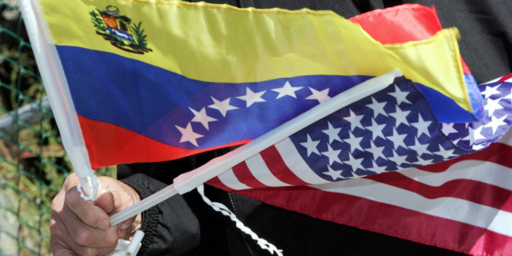
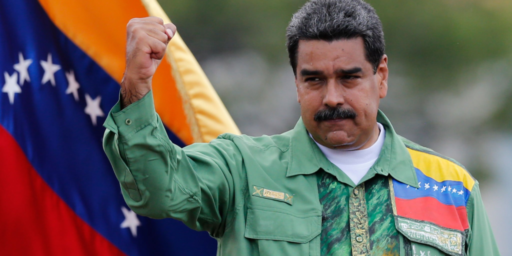
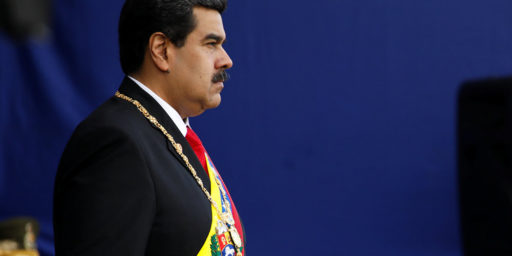
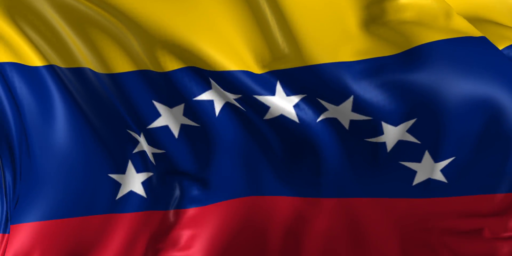
The Trump government has no discipline. There are no secrets being kept. The Chief of Staff gets himself recorded by someone using a cell phone! The only people not actively leaking are writing expose books and columns. Meetings that could lead to illegal covert actions, which by the way every government on earth does, get on the front page. It is missing the point, the whole point, to blame this on the press. This lack of focus and discipline is the fault of Mr. The Buck Doesn’t Stop Here.
What is different about this and the publicized meetings with Tintori, Borges, Maria and so many other opposition leaders. Why wouldn’t the disgruntled military leaders also want to be heard? So what?
@Slugger:
Yeah, I have to agree. If Jazz has a beef with this information coming out, the beef is with an Administration that leaks like a sieve. To carry the D-Day analogy forward, if Trump had been President we would have tweets all week leading up to: “BIG EVENT planned for June 6! I can’t tell you what it (classified) but you’ll really like it!” “Why won’t these athletes support or Brave Troops! They are about to hit beaches at Normandy and deserve our support!”
How do we know that nothing came out of those meetings?
This is the same administration that has had countless meetings with Russian agents during the campaign, denied they happened, then denied the topic, then denied anything came out of them. The track record for honesty is not great.
We need congressional hearings on this.
I’m not saying that I think the Trumpies were helping the coup plotters — and doing a crappy job of it — but at this stage there is no reason to believe that they were not. The claims that nothing came of it could just as easily be the Trump administration disowning the failed plotters after the fact.
If you catch a kid with his hand in the cookie jar, and he says he’s just petting the cookies, do you believe him?
My first thought was: “Great! Let’s normalize the idea that the military can be used to overthrow an incompetent and corrupt government.” That never ends well.
Though Trump is setting horrible new precedents as President, getting involved for no reason in other countries affairs, even to the extent of overthrowing gov’ts, is very old hat for American Presidents.
Thinking Trump is an exception in this regard is to willfully ignore much of American foreign policy (and acts) over the last century. Pretending he’s especially bad in this regard is laughable.
@Scott:
That’s been the standard American gov’t policy for much of the world for the last century – there’s nothing Trump is bringing to this that hasn’t been done before … repeatedly.
This is one reason so many people around the world find it hilarious that Americans are outraged about Russian involvement in American elections.
@Scott:
I just want to go on record that I would oppose a military coup overthrowing Donald Trump. It would not end well.
@Gustopher:
Probably because we know that Maduro has such a strong support in the Venezuelan Military that a coup would not be viable nor realistic.
@Andre Kenji de Sousa: …And yet, there was a coup attempt.
This is not a competent administration, so I would not take the failure of the coup as a sign that there was no US involvement or encouragement. With President Trump musing publicly about military options in Venezuela before this, it seems suspicious.
I do expect that if a coup failed, this administration would deny any involvement, and if presented with evidence of meetings, this administration would deny that anything happened in those meetings.
The Trump administration, with their blatant lies on everything under the sun, has harmed the reputation of America. Our word is not good for anything, and come tomorrow, our word might not even be our word.
@Scott: Come on! Be fair now, we did just that in Iraq and it came out just fine.
@Gustopher:
I would not count the drone attack as a coup attempt. At most it was an assassination attempt, which is not the same thing as a coup attempt.